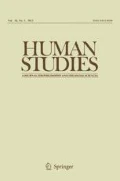Abstract
This paper addresses the relationship between humans and nature as it relates to the ability of human societies to solve large-scale environmental problems. We assert that humans are not unique in their relationship with nature; all species have the ability to externalize their being into the world thus creating environmental problems. We also argue that human consciousness and rationality do not provide ready answers to these problems. Unless we better understand the pretheoretical and pragmatic nature of human consciousness, rational/scientific attempts to deal with large-scale environmental problems will fail. We use a framework derived from Schutzian phenomenology to explain how human consciousness both provides the motivation for creating environmental problems and also impedes any real solutions. Thus, we explore a dialectic of human consciousness that has profound implications for discussions about the ability of humans to solve environmental problems.
Similar content being viewed by others
References
Barchas, P.R. (1984). Social Cohesion: Essays Toward a Sociophysiological Perspective. Westport, CT: Greenwood Press.
Beck, U. (1992). Risk Society: Toward a New Modernity. London: Sage.
Beck, U. (2000). What is Globalization? Malden, MA: Polity Press.
Berger, P.L. (1963). Invitation to Sociology: A Humanistic Perspective. New York: Doubleday.
Berger, P.L. (1967). The Sacred Canopy: Elements of a Sociological Theory of Religion, 1st edition. Garden City, NY: Doubleday.
Berger, P.L. and Luckmann, T. (1966). The Social Construction of Reality: A Treatise in the Sociology of Knowledge. New York: Doubleday.
Bromage, T.G. and Schrenk, F. (Eds.). (1999). African Biogeography, Climate Change, and Human Evolution. New York: Oxford University Press.
Campbell, B. (1985). Human Evolution: An Introduction to Man's Adaptations, 3rd edition. New York: Aldine Publishing Company.
Daly, H.E. (1977). Steady-State Economics: The Economics of Biophysical Equilibrium and Moral Growth. San Francisco: W.H. Freeman.
Dawkins, R. (1987). The Blind Watchmaker (1st Norton paperback edition). New York: Norton.
Dennett, D.C. (1991). Consciousness Explained, 1st edition. Boston: Little Brown and Co.
Dennett, D.C. (1995). Darwin's Dangerous Idea: Evolution and the Meanings of Life. New York: Simon & Schuster.
Descartes, R. and Clarke, D.M. (1999). Discourse on Method, and Related Writings. London: New York: Penguin Books.
Dickens, P. (1996). Reconstructing Nature: Alienation, Emancipation, and the Division of Labour. London: New York: Routledge.
Drake, F. (2000). Global Warming: The Science of Climate Change. London/New York: Arnold. [Co-published in the United States of America by Oxford University Press.]
Durant, J.R. (Ed.). (1989). Human Origins. Oxford: Clarendon Press.
Ekins, P. (1992). A New World Order: Grassroots Movements for Global Change. London: Routledge.
Gehlen, A. (1988). Man, His Nature and Place in the World. New York: Columbia University Press.
Groves, C.P. (1989). A Theory of Human and Primate Evolution. New York: Clarendon Press.
Katz, B. (2000). The Federal Role in Curbing Sprawl. The Annals of the American Academy of Political and Social Science 572: 66-77.
Lowe, M.D. (1992). Alternatives to Sprawl: Shaping Tomorrow's Cities. The Futurist 26(4): 28-34.
Marx, K. (1978). Alienated Labor. In: D. McLellan (Ed.), Karl Marx: Selected Writings, pp. 73-112. Oxford: Oxford University Press.
Natanson, M.A. (1986). Anonymity: A Study in the Philosophy of Alfred Schutz. Bloomington: Indiana University Press.
Prugh, T., Costanza, R., and Daly, H.E. (2000). The Local Politics of Global Sustainability. Washington, DC: Island Press.
Schutz, A. (1962a). Common-Sense and Scientific Interpretation of Human Action. The Hague: Martinus Nijhoff.
Schutz, A. (1962b). On Multiple Realities. In: M. Natanson (Ed.), Collected Papers i: The Problem of Social Reality, pp. 207-283. The Hague: Martinus Nijhoff.
Sherman, L.W. (2000). The Hole in the Doughnut: Center Cities and Sprawl. The Annals of the American Academy of Political and Social Science 572: 50-53.
Thomason, B.C. (1982). Making Sense of Reification: Alfred Schutz and Constructionist Theory. Atlantic Highlands, NJ: Humanities Press.
Washburn, S.L. and Dolhinow, P. (Eds.). (1972). Perspectives on Human Evolution 2. New York: Holt, Rinehart, and Winston, Inc.
Williams, J. (1998). Knowledge, Consequences, and Experience: The Social Construction of Environmental Problems. Sociological Inquiry 68(4): 476-497.
Williams, J.L. (2001). The Rise and Decline of Public Interest in Global Warming: Toward a Pragmatic Conception of Environmental Problems. Huntington, NY: Nova Science Publishers.
Author information
Authors and Affiliations
Rights and permissions
About this article
Cite this article
Williams, J., Parkman, S. On Humans and Environment: The Role of Consciousness in Environmental Problems. Human Studies 26, 449–460 (2003). https://doi.org/10.1023/B:HUMA.0000003671.30924.8d
Issue Date:
DOI: https://doi.org/10.1023/B:HUMA.0000003671.30924.8d




